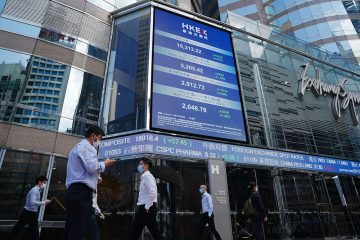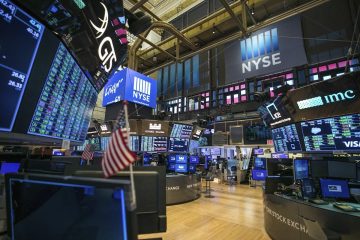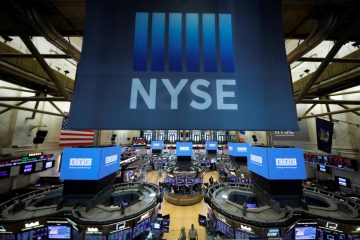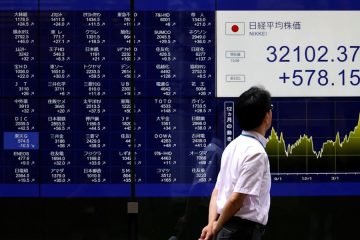Global Markets: Asian shares spooked by rising U.S. yields, cost worries
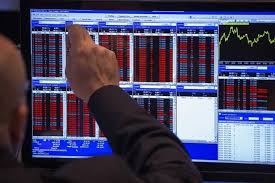
Asian shares fell on Wednesday as a rise in U.S. bond yields to 3 percent and warnings from bellwether U.S. companies of higher costs drove fears that corporate earnings growth may peak soon.
MSCI’s broadest index of Asia-Pacific shares outside Japan .MIAPJ0000PUS dropped 0.7 percent to its lowest in almost three weeks, with tech-heavy Taiwan shares .TWII hitting two-month lows on worries about slowing semi-conductor demand.
Japan’s Nikkei .N225 also dropped 0.7 percent.
S&P E-mini futures ESc1 slipped 0.2 percent. Wall Street shares skidded overnight, with the S&P 500 .SPX falling 1.34 percent, the most in two-and-a-half weeks.
Industrial heavyweight Caterpillar (CAT.N) beat earnings estimates due to strong global demand but its shares tumbled 6.2 percent after management said first-quarter earnings would be the “high water mark” for the year and warned of increasing steel prices.
“We’ve seen quite a lot of companies announcing above-estimate earnings and their shares falling sharply,” said Norihiro Fujito, senior investment strategist at Mitsubishi UFJ Morgan Stanley Securities.
Fujito noted major financial shares such as Goldman Sachs (GS.N) and Citigroup (C.N) as well as Google parent Alphabet GOOG.N, the first major tech firm to report earnings, have followed a similar pattern.
Corporate earnings are in solid shape, with analysts estimating 21.1 percent growth in the Jan-March quarter among U.S. S&P500 firms according to Thomson Reuters data. A similar trend is expected globally.
(For a graphic of global corporate earnings click reut.rs/2FeyaIU)
“If shares are falling when corporate earnings are rising 20 percent and the economy is growing at 3 percent, the market is in trouble. The market reaction so far feels as if we are starting to see an end of its long rally since 2009. Investors could be thinking that the best time will be soon behind us,” he said.
Creeping gains in U.S. Treasury yields are fuelling fears. The 10-year yield, a benchmark for global borrowing costs, has been driven steadily higher by a combination of concerns over inflation, growing debt supply, and rising Federal Reserve borrowing costs.
The 10-year U.S. Treasuries yield US10YT=RR rose to as high as 3.003 percent on Tuesday and last stood at 2.992 percent.
A break of its January 2014 high of 3.041 percent could turn investors even more bearish.
Fed Funds rate futures prices <0#FF:> have been constantly falling this month, pricing in a considerable chance of three more rate hikes by the end of this year.
Rising U.S. rates underpinned the U.S. dollar in the currency market.
The euro stood at $ 1.2226 EUR=, not far from Tuesday’s low of $ 1.2182, a low last seen on March 1.
The dollar traded at 108.87 yen JPY= after having jumped to a 2 1/2-month high of 109.20 yen on Tuesday.
Against a basket of major currencies, the dollar index .DXY edged up 0.1 percent.
Oil prices slipped back from near 3-1/2-year highs as talks between U.S. President Donald Trump and French President Emmanuel Macron eased concerns Washington may reinstate sanctions against Iran, although Trump refrained from committing to staying in a 2015 nuclear deal.
Brent LCOc1 fetched $ 73.77 a barrel, little changed on the day. On Tuesday it rose to $ 75.47, its highest since November 2014. West Texas Intermediate (WTI) crude CLc1 traded flat at $ 67.66.
WTI’s discount to Brent WTCLc1-LCOc1 widened to as much as $ 6.32, the most since Jan. 2, on rising U.S. production.

